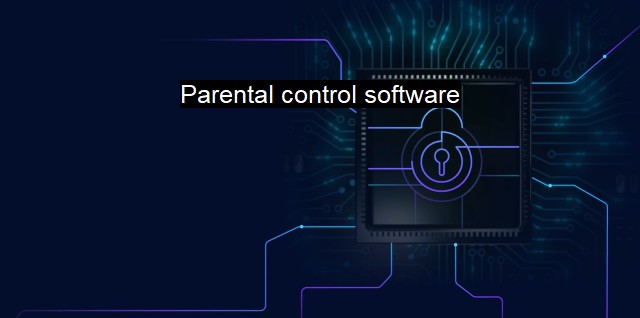What is Parental control software?
Protecting Kids Online: Understanding and Utilizing the Capabilities of Parental Control Software
Parental control software is a significant tool used to protect children and youngsters when using computers and engaging with the internet. The software provides a stringent barrier of protection for young internet users over digital content and their operations on digital devices. Within the wider context of cyber security and antivirus software, parental control programs are an integral part of the digital ecosystem, protecting its youngest users from potential harm.Cybersecurity can be best characterized as the act of defending digital networks and systems against harmful digital corruption and cyber threats. Similarly, antivirus software is built to protect a computer or a network from viruses and malware to prevent an attack from compromising or corrupting data. They function on the principles of cybersecurity, scanning each data packet transmitted within the system for approaching threats. Hence in the broader context of cybersecurity and antivirus software, parental control software usage resides as an acting shield against numerous harmful possibilities.
Parental control software works by filtering digital content to prevent children from accessing inappropriate internet content. It uses technology to enforce rules and perform actions like blocking selected websites, restricting specific software, and monitoring the activities of children online. This gives parents the control to shape the online experience of their children by limiting the extent of their accessibility.
In addition to content filtering, parental control software also regulates Screen Time to help manage the amount of time spent by a child on the internet. Screen Time includes the usage of apps, e-mailing, camera functions, social networking, browsing, file downloading, and even device settings. Parental control software permits parents to set time limits for specific activities or overall usage, enabling them to control excessive use.
Parental control software aids in positioning safety layers against different classes of cyber threats. For instance, phishing is a common scheme targeting naive internet users, extracting their personal information by pretending to be from a legitimate source. Parental control software frequently includes security features to safeguard against threats like phishing.
The use of digital technology and the Internet has become inseparable in individuals' daily lives, thus multiplying cyber threats exponentially. Consequently, the application of parental control software plays a pivotal role in ensuring online safety for children in the face of these arising threats. It serves as both a gateway and a filter that nips such threats in the bud, encouraging safe internet habits, and facilitating the better navigation of children in cyberspace.
Similar to traditional antivirus software, parental control software also provides valuable data protection. It safeguards data exchanged over the Internet networks that children are browsing and often includes built-in antivirus software to protect from potential malware that might be attached to unsolicited emails or suspicious websites.
As digital crime and threats continue to become more sophisticated with advancements in technology, cyber security including and beyond parental control software will play an increasingly pertinent role in the digital ecosystem. Understanding the larger context of digital threats, including the connection between antivirus software, cybersecurity, and parental control software, has become an essential modern skill. It paves the way to help untangle the dangers of the digital world and builds a securer wall of protection for internet users of all ages.
Parental control software could be considered a necessity in the digital world. Alongside antivirus programs, it offers an extra layer of prevention against the myriad of threats present online, particularly designed to safeguard minors. Today, this software encompasses a depth of restrictive and analytic functions catering to the growing demand for cybersecurity, making the online environment safer for young users around the world.

Parental control software FAQs
What is Parental Control Software?
Parental control software is a type of software designed to protect children from inappropriate content on the internet. It allows parents to monitor and control their children's online activity, including websites visited, social media activity, emails, and instant messaging.How does Parental Control Software work?
Parental control software works by monitoring your child's online activity and blocking inappropriate content. You can set up filters that block certain websites, social media platforms, or specific types of content. Some parental control software also allows you to set time limits on your child's online activity and monitor their instant messaging conversations.Is Parental Control Software only useful for young children?
No, parental control software is not only useful for young children. Children of all ages can benefit from parental control software, as it helps them avoid exposure to inappropriate content, cyberbullying, and online predators. Even teenagers, who may be more savvy about the internet, can benefit from parental control software.Can Parental Control Software replace the need for parental supervision?
No, parental control software should not replace the need for parental supervision. While parental control software can help parents monitor and control their children's online activity, it is not a substitute for parental supervision. It is important for parents to talk to their children about internet safety and set rules for online behavior.| | A | | | B | | | C | | | D | | | E | | | F | | | G | | | H | | | I | | | J | | | K | | | L | | | M | |
| | N | | | O | | | P | | | Q | | | R | | | S | | | T | | | U | | | V | | | W | | | X | | | Y | | | Z | |
| | 1 | | | 2 | | | 3 | | | 4 | | | 7 | | | 8 | | |||||||